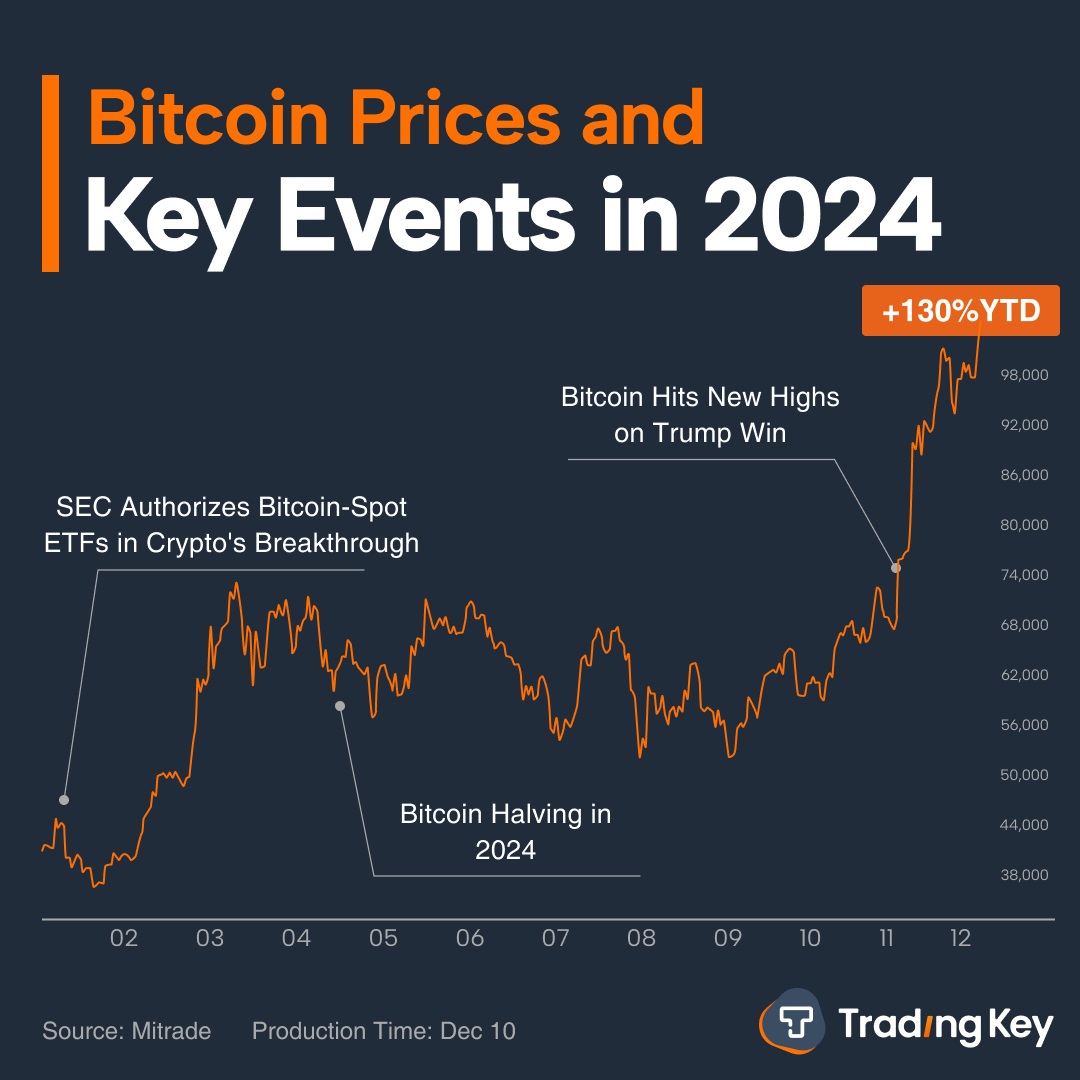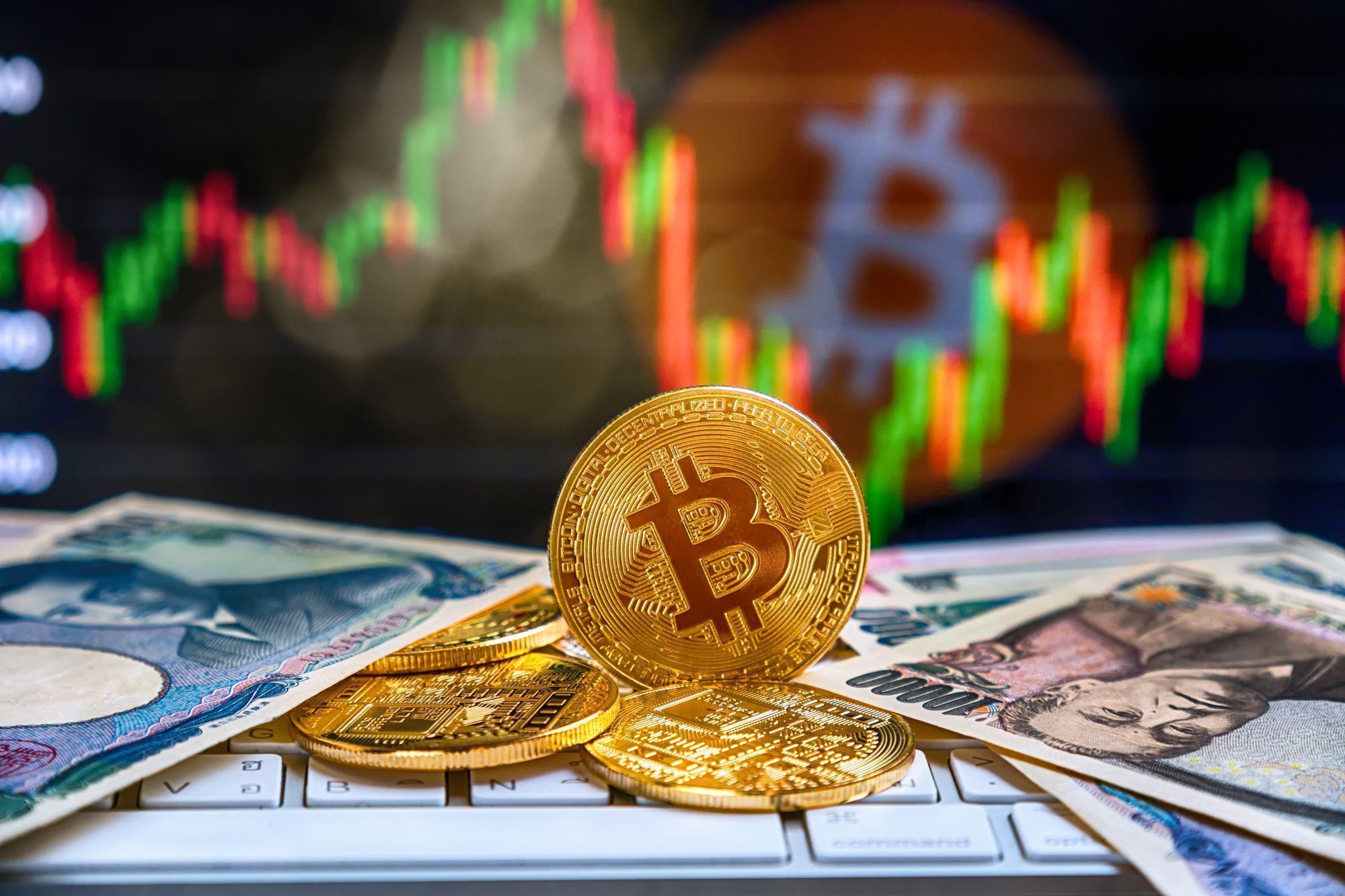Top 10 Market-Moving Events in 2024
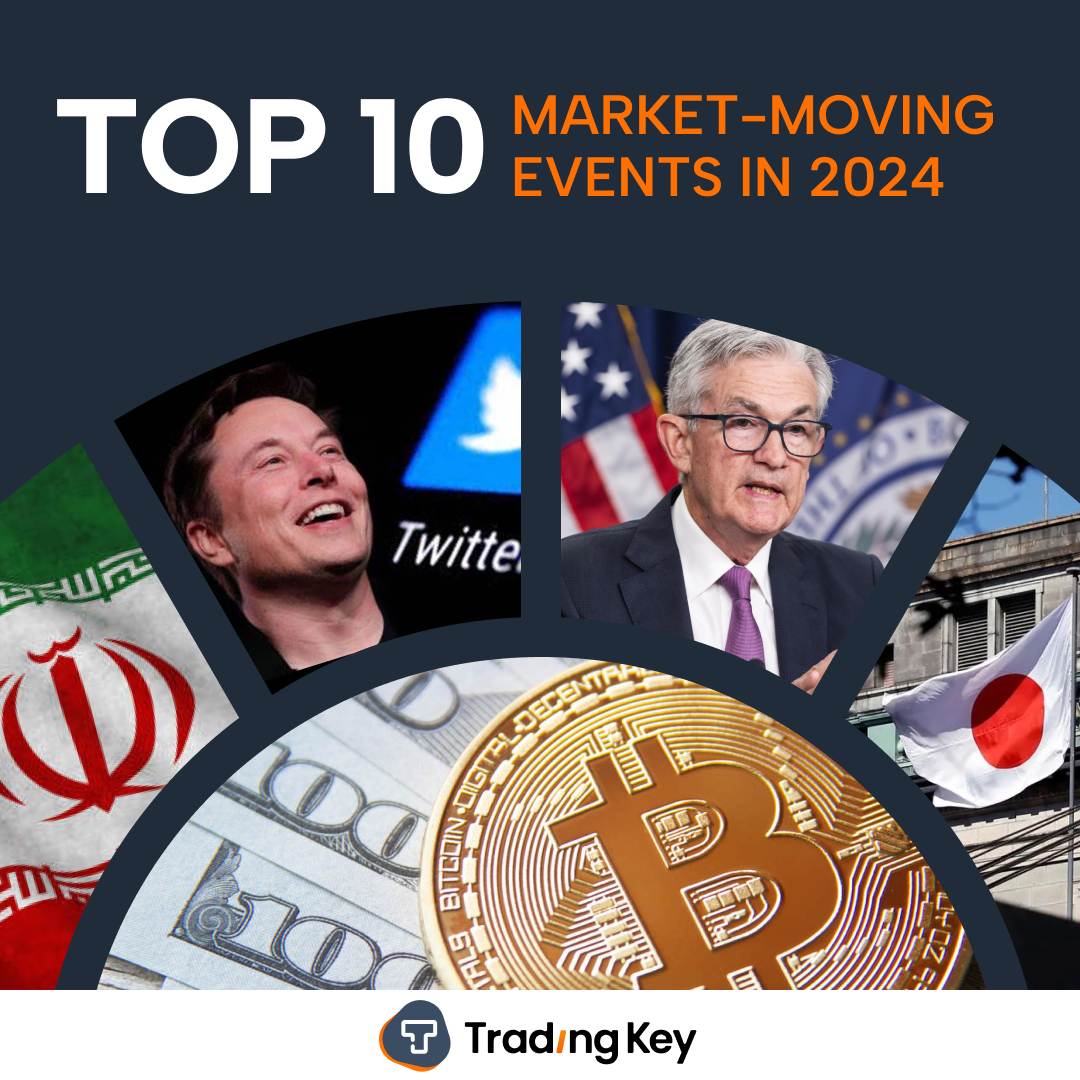
TradingKey - The year 2024 has been marked by significant economic and geopolitical developments that reshaped global financial markets. From monetary policy shifts and political transitions to technological breakthroughs and asset price surges, the following are the 10 most impactful events that defined the year.
1. Bank of Japan Ends Negative Interest Rates
The Bank of Japan (BOJ) ended its eight-year negative interest rate policy in 2024, raising its policy rate twice—first to 0%-0.1% in March and later to 0.25% in July. While the initial hike supported equity markets, with the Nikkei 225 surpassing 40,000, the follow-up hike triggered sharp corrections, erasing earlier gains.The impact extended globally, dragging down multiple international markets, with stock exchanges in South Korea and Turkey triggering circuit breakers. In December, the BOJ held its final monetary policy meeting of the year, with markets anticipating an additional 25 basis point hike. Rising "headwinds" now loom on the horizon.
2. NVIDIA Leads Global Market Cap Rankings
NVIDIA’s market capitalization reached $3.34 trillion in June, briefly overtaking Microsoft and Apple to become the most valuable company globally. The company’s stock surged 180% year-to-date, driven by robust demand for AI chips from major technology firms, including Tesla, Microsoft, and Google. This growth far outpaced the broader market, with the Nasdaq gaining 29% and the S&P 500 rising 28% over the same period. NVIDIA’s dominance reflects the critical role of AI in driving technological and economic transformations.
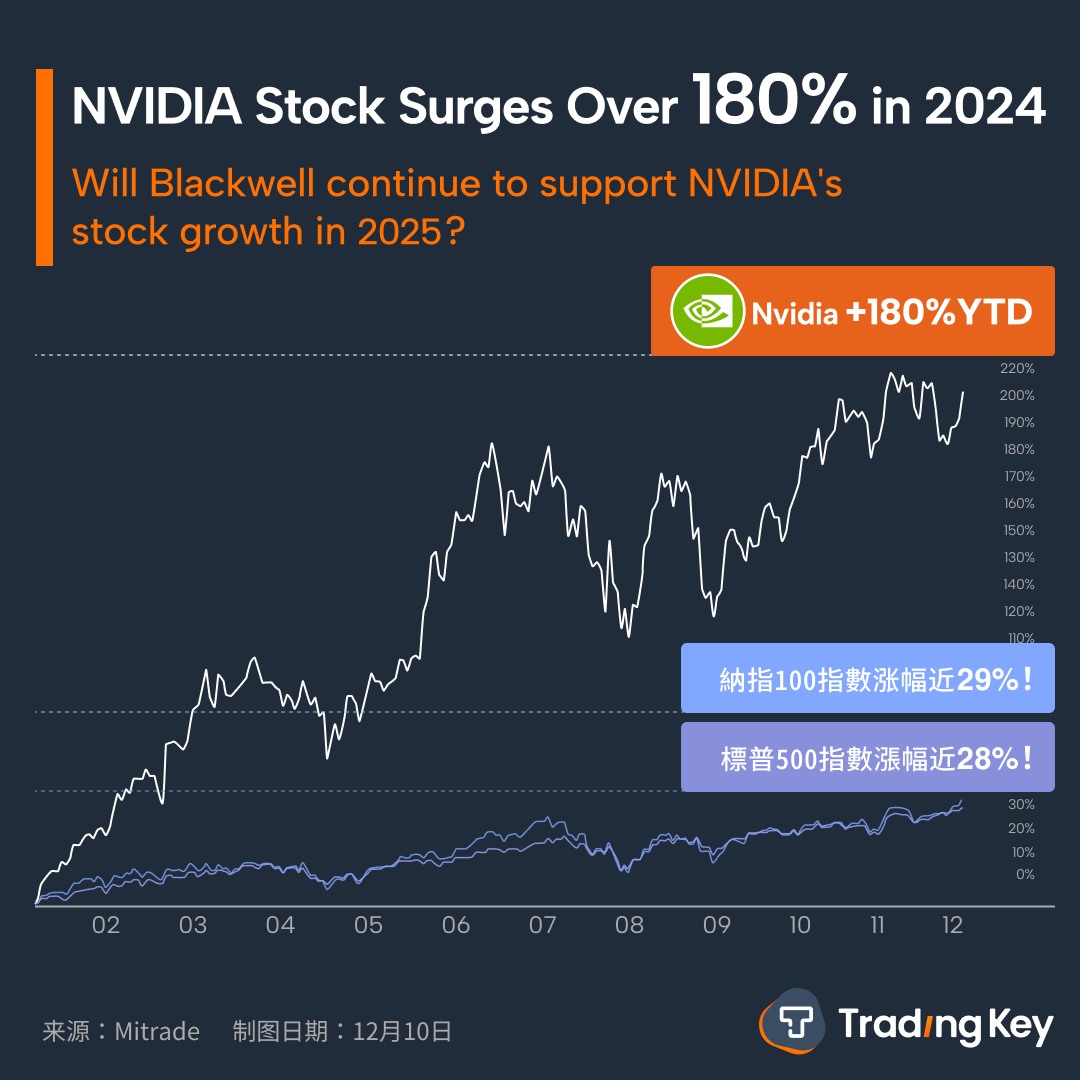
3. Federal Reserve Initiates Rate Cuts
The Federal Reserve reduced the federal funds rate twice in 2024, marking the start of a monetary easing cycle. The first cut in September lowered the target range to 4.75%-5.00%, followed by a November cut to 4.50%-4.75%. According to CME FedWatch data, there is a possibility of another 25-basis-point rate cut on December 18, which could further reduce funding costs, improve market liquidity, and provide additional support to assets such as gold and U.S. equities.
4. China Rolls Out Fiscal and Monetary Policies to Boost Markets
On September 24, the People’s Bank of China, the Financial Regulatory Administration, and the China Securities Regulatory Commission introduced a series of measures, including a reserve requirement ratio cut, housing market incentives, a RMB 1 trillion liquidity injection, and policy rate reductions. These moves significantly boosted Chinese equities, with the Shanghai Composite, Shenzhen Component, and ChiNext indices rising over 4%. On October 12, the Ministry of Finance announced a RMB 4 trillion fiscal package, featuring debt restructuring, housing price stabilization, and consumer subsidies. The coordinated approach reinforced investor sentiment and highlighted China’s commitment to economic recovery.
5. Trump Returns to the Presidency
On November 6, Republican candidate Donald Trump defeated Democratic candidate Kamala Harris to win the presidency, becoming the 47th U.S. president. Trump's re-election triggered a pronounced "Trump trade" in financial markets, driving a sharp rally across various asset classes. On the same day, Bitcoin surged 9%, the Dow Jones Industrial Average jumped 3.6%, the S&P 500 rose 2.5%, the U.S. Dollar Index gained 1.7%, and the yield on the 10-year U.S. Treasury increased by 16 basis points. The market’s strong reaction reflected heightened optimism and expectations for Trump’s return to office.
6. Gold Prices Approach $2,800
Gold prices reached a high of $2,790 per ounce in late October, reflecting a 37% year-to-date increase. The rally was driven by multiple factors, including conflicts in the Middle East, the escalation of the Russia-Ukraine war, the U.S. presidential election, Federal Reserve rate cuts, and significant gold purchases by central banks in emerging markets. Gold’s performance underscores its role as a safe-haven asset amid heightened global uncertainty.
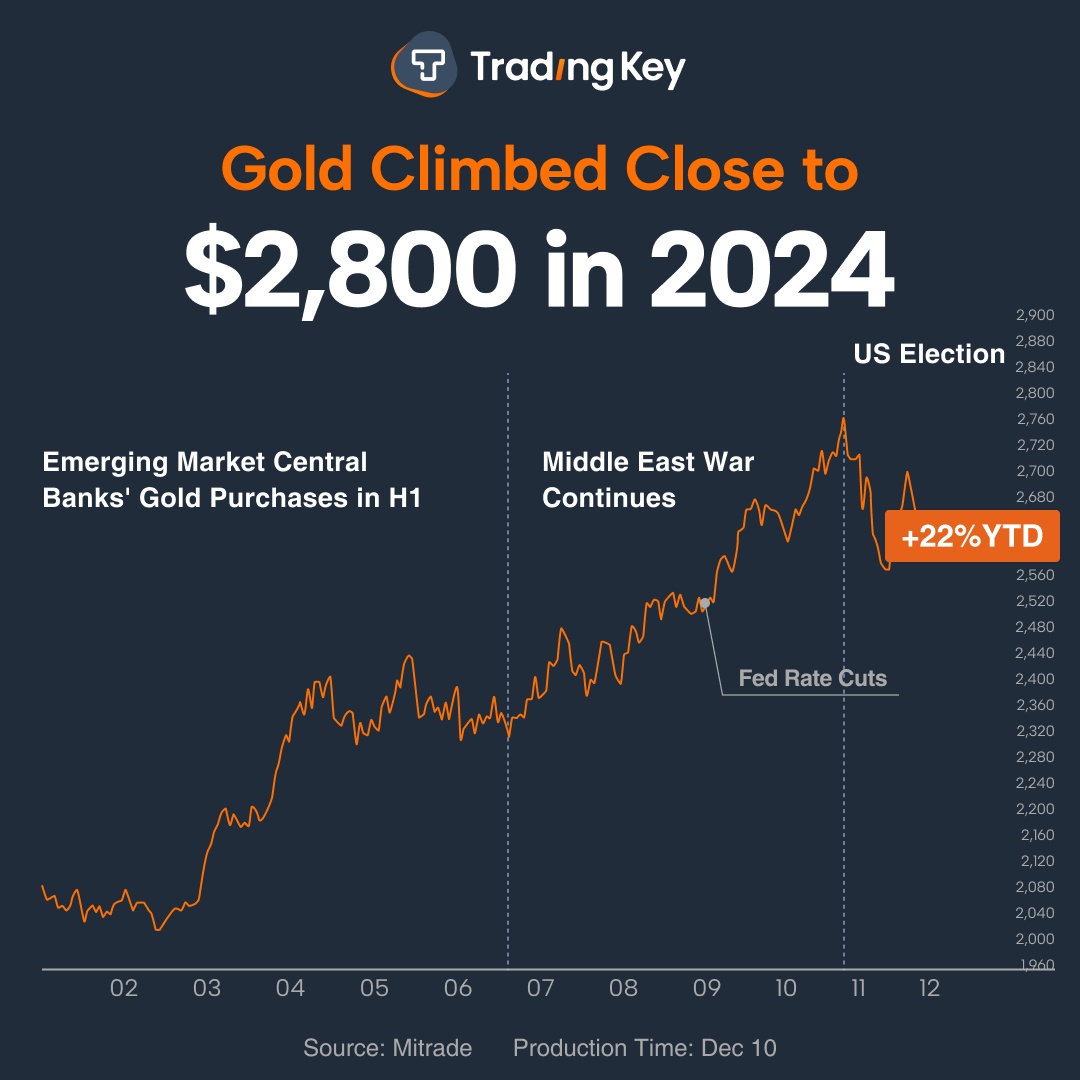
7. Elon Musk Leads Government Efficiency Department
On November 12, newly elected U.S. President Donald Trump announced the establishment of the "Department of Government Efficiency" (DOGE), an unprecedented move in American history. The department will be co-led by Elon Musk and Vivek Ramaswamy, tasked with dismantling bureaucratic barriers, reducing excessive regulations, cutting wasteful spending, and restructuring federal agencies. Musk previously pledged to slash the federal budget by more than one-third and reduce the number of federal agencies from 428 to 99. If Musk’s ambitious reforms are implemented, they are expected to significantly disrupt the U.S. political landscape.
8. Persistent Geopolitical Risks
Israel and Hezbollah reached a ceasefire agreement on November 26, bringing an end to more than a year of conflict and easing tensions in the Middle East. As a result, market risk aversion subsided, leading to declines in gold and crude oil prices, while global shipping stocks dropped over 5%. Last week, Syrian leader Assad was overthrown, bringing the Middle East back into the spotlight. Meanwhile, the protracted Russia-Ukraine conflict remains unresolved, with neither side willing to compromise. Geopolitical uncertainties persist, keeping the global landscape in a state of volatility.
9. South Korea’s Martial Law and Market Impact
South Korea experienced a brief period of political instability in December when President Yoon Suk-yeol declared martial law. Although the measure was lifted within hours due to parliamentary pressure, the announcement caused significant market disruptions. The iShares MSCI South Korea ETF dropped over 7%, the Korean won depreciated 2.3% against the U.S. dollar, and Bitcoin prices on local exchanges plunged 30%. The episode underscored the sensitivity of financial markets to political events.
10. Bitcoin Hits $100,000 Milestone
On December 5, Bitcoin surged past the 100,000 mark, shattering what many once considered an unattainable milestone.Bitcoin has climbed 130% year−to−date. Currently, Bitcoin ranks as the 7th largest global asset, trailing only gold, Apple, NVIDIA, Microsoft, Amazon, and Alphabet. This remarkable achievement has been fueled by a series of key events, including the SEC’s approval of a spot Bitcoin ETF, the quadrennial halving cycle, the U.S. presidential election, and Federal Reserve rate cuts.
